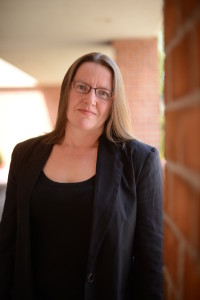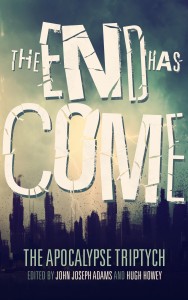
In collaboration with editors John Joseph Adams and Hugh Howey, A Dribble of Ink is proud to introduce a series of interviews with the authors of The End Has Come, the final volume in the The Apocalypse Triptych. Following on The End is Nigh, and The End Is Here, The End Has Come contains 23 stories about life after the apocalypse.
Interview with Elizabeth Bear “Margin of Survival”
(Interview by Jude Griffin)
How did “Margin of Survival” come about?
That’s one of those impossible questions, really, but I can at least manage to line up some of the sparks. Somewhere, some time ago, I read about the nuclear-powered, abandoned lighthouses left after the collapse of the Soviet Union, and of course I live in New England, which is known for its lighthouses—most of which are largely automated now as well. And that image of a beacon, forgotten on a beach somewhere after the end of civilization, struck me as incredibly poignant.
The story grew up around that, and some reading I’ve been doing on what Bruce Sterling refers to as “Involuntary Nature Reserves,”–places like the Chernobyl exclusion zone, where we’ve created such a toxic mess that people can’t safely live there anymore.
The description of Yana’s hunger, the different kinds, how some were empowering and others were enervating, felt so real that I immediately assumed you were writing from experience. Were you?
I’ve never experienced real long-term hunger of the sort Yana has… but I have been broke enough to wonder where my next meal was coming from, and I’ve done enough long-distance hiking and running to experience that need for fuel that comes with it.
There is so much tension around Yana’s infiltration, what she finds, and how she gets out, that I was almost surprised to go back and realize that the whole of the story shows us only two people. It almost felt like the kind of work playwrights must do–suggest so much while keeping the stage relatively clear. Do you write plays? Was it challenging to write such a story so spare in some ways and rich in others?
To me, short stories and plays are very similar in their constraints, actually. They both require extreme economy: there’s not as much room for expansiveness as there is in a novel. You need to get as much use out of everything as possible.
It’s actually really hard for me to switch back and forth between novels and short stories. The short story mode is too dense for a novel; it becomes exhausting to the reader. Novels need a little more breathing room and a little more room for repetition and reinforcement. They may be read over a period of weeks, as opposed to half an hour, and so much of what you’re doing in a novel has to be robust enough to stand up to that sort of break in the experience. Novels have room for more engineering, more failsafes and several engines! Short stories are more like the World War II fighter plane, the Zero: They do one thing and they do it as efficiently as possible, without much tolerance for error.
That ending was hard to read–what made it the right one for this story?
It was hard to write, too. I’m going to try to answer this question without spoiling.
Some of it is my growing distrust, as I get older, of the Cozy Catastrophe–the idea that the world may end, but all of our friends will survive and we’ll get to build a perfect world in the ashes. Sort of Swiss Family Robinson with nukes.
Some of it is just the way the story went. I feel that relentless darky-darkness is just as intellectually dishonest as the opposite, but I also acknowledge that sometimes, for some people, things just don’t end well. I feel like art in honesty needs to reflect both hope and despair.
I noodled with three or four different endings, and this was the one that didn’t feel pat and expected to me. I guess it’s a matter of, “try on a lot of hats; buy the one that suits the outfit.”
Any projects/news you want to tell us about?
I have a new novel out. It’s called Karen Memory, and it’s a stand-alone wild west steampunk adventure starring heroic saloon girls versus wicked disaster capitalists.
I’m currently working on a fourth book in the Eternal Sky series–the first in a new trilogy, with different characters, in a different part of the world! It’s called The Stone in the Skull. I’m also working on a big-idea far-future space opera called Ancestral Night. Both will be out next year–The Stone in the Skull in the US from Tor and Ancestral Night in the UK from Gollancz.
About Elizabeth Bear
Elizabeth Bear was born on the same day as Frodo and Bilbo Baggins, but in a different year. When coupled with a tendency to read the dictionary for fun as a child, this led her inevitably to penury, intransigence, and the writing of speculative fiction. She is the Hugo, Sturgeon, and Campbell Award-winning author of almost a hundred short stories and more than twenty-five novels, the most recent of which is Karen Memory. Her dog lives in Massachusetts; her partner, writer Scott Lynch, lives in Wisconsin. She spends a lot of time on planes.

Buy The End Has Come, edited by John Joseph Adams and Hugh Howey
About the anthology
Famine. Death. War. Pestilence. These are the harbingers of the biblical apocalypse, of the End of the World. In science fiction, the end is triggered by less figurative means: nuclear holocaust, biological warfare/pandemic, ecological disaster, or cosmological cataclysm.
But before any catastrophe, there are people who see it coming. During, there are heroes who fight against it. And after, there are the survivors who persevere and try to rebuild.
Edited by acclaimed anthologist John Joseph Adams and bestselling author Hugh Howey, The Apocalypse Triptych is a series of three anthologies of apocalyptic fiction. The End Is Nigh focuses on life before the apocalypse. The End is Now turns its attention to life during the apocalypse. And The End Has Come focuses on life after the apocalypse.
Buy the book
The End Has Come is available as a trade paperback or eBook.
